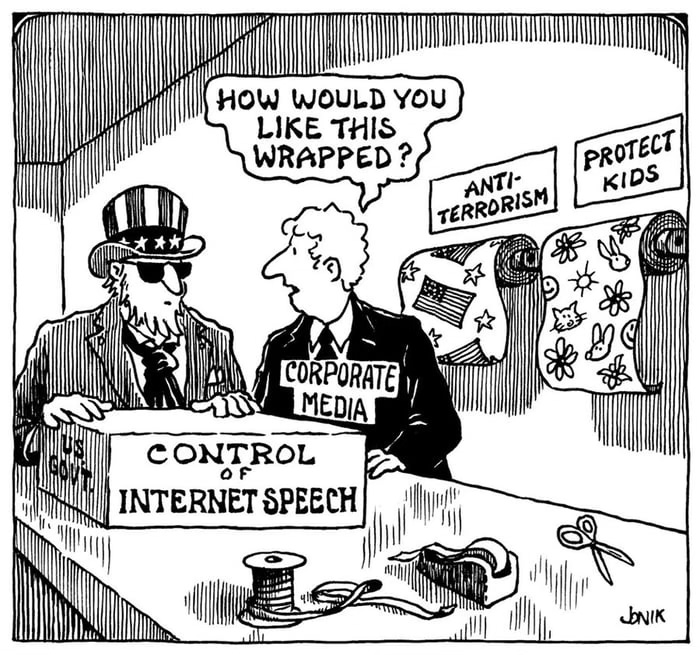To alleviate our collective economic pain, 8Ball subscriptions are 20% off for the next month. Find the offer here: www.8ball.report/recession
Vibe Coding Fail or the Tea Dating Advice hack
Narks or ChatGPT can be used in court
LifeLog or the Facebook conspiracy theory
1984 or Think Before You Post
Fortress Britain or the Online Safety Act
Anti-Surveillance or the legality of VPNs
The internet as we know it is in failure mode:
1. the internet is too open
We are free to post anonymously and free to associate with whomever we choose; we are free to share sensitive information about ourselves and free to share sensitive information about others; we are free to consume extreme political content and extreme pornographic content.
The internet operates too closely to the dictum misattributed to Voltaire:
"I disapprove of what you say, but I will defend to the death your right to say it."
2. the internet is too closed
Everywhere the drawbridges are going up. We cannot see the protocols that structure the internet, but we can feel it. Google searches do not work anymore. AI alignment is more difficult to achieve than expected. We either get Google Gemini unable to generate an image of George Washington without making him Black. Or we get Grok self-identifying as MechaHitler. Links break. Websites disappear. Algorithms refer us the same content again and again and again.
The invisible hand of the internet controls the flow of information, but we do not know quite who controls; if anyone controls it at all.
Three interesting news items from this week.
The first garnered a lot of attention: the hack of the dating app Tea, a platform where women could anonymously share information about problematic male partners. The vibe-coded app was holding drivers licenses, selfies, location data and chat logs in unsecured databases. Is it a hack if there was no security in the first place?
The second was a footnote: Sam Altman admitting the TOS for ChatGPT allows for your chat logs to be used against you in court. This shouldn’t come as a surprise. Since the disclosures of Edward Snowden, we have known that the NSA is conducting vast data gathering activities in the background. Somewhere on the darkweb, everyone’s Social Security numbers are for sale. Conspiracy theorists insist Facebook was created by American intelligence services, that it is a continuation of a DARPA project, LifeLog. If you want to know everything about someone, just ask them. Or as Mark Zuckerberg said in 2004:
"People just submitted it. I don't know why. They 'trust me'. Dumb fucks."
The internet is full of secrets, but that doesn’t mean it is safe for yours:
the internet is too free
The third has dominated X discourse and British media reporting. The Online Safety Act of 2023 has come into effect. Users need to submit official identification and submit to facial analysis to access controversial material. Content relating to the following is banned online:
child sexual abuse
controlling or coercive behaviour
extreme sexual violence
extreme pornography
fraud
racially or religiously aggravated public order offences
inciting violence
illegal immigration and people smuggling
promoting or facilitating suicide
intimate image abuse
This is a list that includes topics are already criminalized (inciting violence, child sexual abuse), with politically sensitive topics where what constitutes "extreme" and what political discourse is acceptable. Already a speech by a Conservative Member of Parliament has been removed from X.
Should the government be able to censor political speech from their opponents?
A petition to the British government racked up 400K signatures in 24 hours, demanding the repeal of the new law. The government declined, citing children’s safety as the primary motivator for the new measures.
With VPN downloads skyrocketed to avoid the new restrictions, a total VPN ban is now being debated. If VPNs are banned, Britain will join Belarus, Iraq, North Korea, and Turkmenistan as the fifth country to outlaw the encryption technology. Additionally, Russia, China, Iran, the United Arab Emirates, Turkey, and Oman restrict VPN usage.





